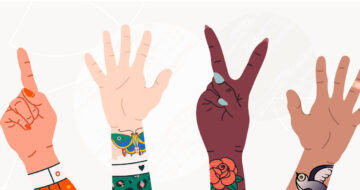5 Reasons “No” Is the Most Important Word You’ll Learn
I loathe confrontation; in fact, I hate it so much I try to avoid it at all costs. I know I’m not alone on this; it’s one of the many reasons we find “no” such a difficult word to say. At our core, we’re empathetic people, raised to be polite, share with our friends and be “team players.”
No wonder it’s so hard figuring out when to politely decline anything.
But here’s the thing, learning how to say “no” is one of the most critical skills you’ll develop in your adult life. Without it, you risk overcommitting your time, living in chaos, and feeling perpetually under pressure.
We’re going to look at the top 5 reasons “no” is the most important word you’ll ever learn, and how to use it effectively.
1. Saying “no” makes you the expert
Saying no to opportunities at your shop boils down to whether or not it fits in with your vision and goals. If it doesn’t, look away. You know what you’re good at and how you see the future. If an event or idea doesn’t align with your ambitions, say “no.”
How does that relate to daily life or on a client-by-client basis?
Well, at first it might seem like taking all types of appointments is the fastest way to make money. But, if your goal is to specialize, saying yes to everything can be detrimental in the long term.
For example, if you’re a black work tattoo artist and the opportunity arises for a large color piece it can be tempting to take it. Money is hard to say no to. But what happens when you do a killer job, and more color pieces start rolling in? It’s difficult to be known as the “expert” in your industry when your portfolio isn’t niched to your specialty.
What if instead of saying “yes” to clients outside your niche you said “no?”
And look, I understand how difficult it is to say “no,” especially when you’re first starting – I had to do it myself. In my first year as a makeup artist, I was getting referrals to do bridal, boudoir, runway, tv and maternity. Not exactly streamlined. Even though I loved being busy ($$$), I was watering down my talent & ultimately my worth as an artist.
This same rule applies to you. You should always be booking clients focused on becoming an expert. I completely understand the need to take a gig outside your niche. After all, bills need to get paid, that’s reality.
Just remember, when you’re known as the master in your industry, clients will seek you out, and you’ll be able to charge what you’re worth.
2. Learn how to focus on reaching your goals
What do the next 12 months look like for you? Is there a list of goals you’d like to achieve?
The truth is, most of us have way too many goals in our head and no real plan on how we’re going to accomplish them. On top of that, we continue to take on extra projects when we’re already maxed out.
According to Warren Buffet (you know him, estimated net worth of 82.9 billion, and yeah, that’s with a B), there’s a three-step strategy that will help you say good-bye to busy work and begin prioritizing your goals. After all, it was Buffet who said:
“The difference between successful people and really successful people is that really successful people say no to almost everything.”
Here’s his three-step strategy for focusing in on your goals:
- Write your top 25 goals down on a piece of paper (don’t worry if you can’t think of 25 super meaningful ones, do your best)
- Circle your top 5
- Take the 20 goals you didn’t circle and get rid of them. You’re no longer going to think about them, work towards them or even look at them until your top 5 are complete.
The genius of this strategy is it highlights the benefits of saying “no.” You need to make yourself and your goals a priority. Don’t fall prey to:
- saying “yes” to any old task
- someone else’s obligation
- a distraction that isn’t going to propel you towards your end game
If you stick to this plan, you’ll accomplish your goals more efficiently.
Related Post: How to Balance Work and Life: The Ultimate Guide
3. Set boundaries with your clients
One of the biggest reasons “no” is the most important word you’ll learn is it’s the one you’ll use to set boundaries with clients.
We work in an industry that’s client-focused, frequently tossing around the motto “the customer is always right.” While that turn of phrase is a good jumping off point, it’s easy for your boundaries to get crossed causing stress to go through the roof if taken literally.
Here’s an example:
Your client arrives for their appointment, and it’s a gnarly cover up. They’ve brought along images of what they’d like their new piece to look like, and you immediately know it’s just not realistic.
After explaining their expectations vs. your reality, they still insist on moving forward with their goals – what do you do?
You know the final result won’t be representative of your skill and talent, so it’s up to you to say “no.” Will it be hard? Of course. Boundaries are created—they aren’t assumed in your relationships. With client satisfaction being your number one priority it will also take some finessing on your end. If set up correctly, your stress level is going to be more manageable, your clients will be happy, and your reputation will remain intact.
4. Time is under your control
When you think about what means the most to you what comes to mind? For me, it’s time.
Time is our most valuable possession – we all start with 24 hours in our day, but it’s how we choose to manage that time that counts.
Our culture is enamored with being “busy,” and we’ve elevated this state of chaos to a badge of honor. We’re in awe of people who seem to have it all and can do it all – even though we know, it’s impossible.
Related: Why Is “Busy” A Badge of Honor?
The truth is, we’re afraid if we say no to taking on new projects, meetups with friends, extra hours at work – we’ll be letting people down, burning bridges or making ourselves seem less than.
What it comes down to is understanding how to say “no” conclusively. When you learn how to do this, you’ll be demonstrating how much you value your time, respect your boundaries, and you’ll regain control.
Here are a couple of examples for saying no when it comes to controlling your time:
- My calendar is full at the moment with prior commitments.
- I’m in the middle of something at the moment, is it OK if I get back to you at a later date?
- I don’t think that I’m the right person for that job, but I have a person that I can refer you to.
5. Build a business you love
It’s impossible to handle all parts of your business, nor are you passionate about them. If you’re a barber, the chances that spending hours of your time building your website fills your belly with fire is slim. Or that as a tattoo artist, you’re counting down the days until you can dig deeper into your accounting.
It takes a big person to admit that they lack a specific business skill and to hire a professional to handle the task. If you say “no” to the parts of your business that aren’t your core genius you’ll save time, money and heartache.
Let’s look at it this way.
If you’ve jam-packed your schedule with things you aren’t passionate about and your dream gig comes through – what will you do? Without the flexibility you’d have by saying “no” to those things outside your primary goals, you won’t have the time.
The bottom line
To be happy and prosperous it’s time to learn how to say “no” effectively. Without this skill, you’ll never have the time you need to say “yes.”
Do you struggle when it comes to saying “no” within your business? Let us know in the comments 👇; we’d love to hear from you.














